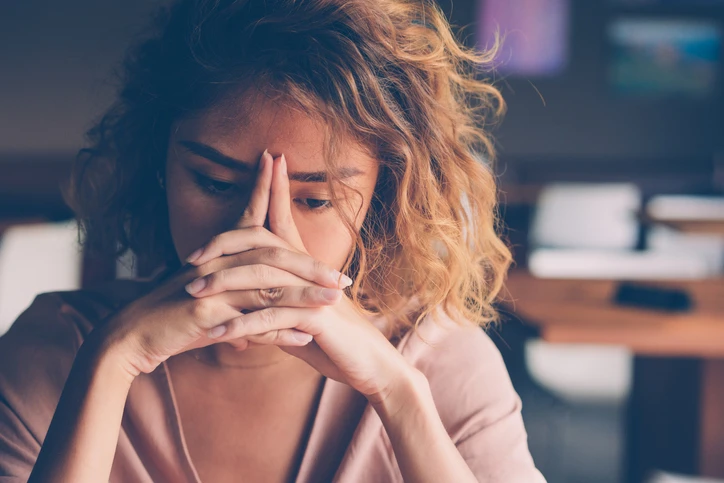
Treating Anxiety Disorders near State College, PA
If you suffer from persistent anxiety, you are not alone. Anxiety disorders affect millions of individuals worldwide, including 40 million U.S. adults (19.1% of the U.S. population). Anxiety can manifest as generalized anxiety disorder (GAD), panic disorder, social anxiety disorder (SAD), and specific phobias, all of which can significantly impair one’s quality of life, impacting daily functioning and overall well-being.
If you or a loved one is struggling with anxiety, St. Joseph Institute in Port Matilda, PA, can help. We welcome clients with mental health concerns, substance use disorders such as alcohol and drug addiction, and co-occurring disorders. Our mental health professionals will provide you with a thorough assessment and comprehensive, holistic treatment that will give you the tools to manage your mental health successfully after treatment ends.
What is an Anxiety Disorder?
Anxiety disorders are characterized by excessive fear, worry, and apprehension that are disproportionate to the actual threat. Everyone gets nervous from time to time, but individuals with an anxiety disorder often experience persistent, intense anxiety that interferes with their ability to function normally. Symptoms may include but are not limited to:
- Physical symptoms (rapid heart rate, sweating, trembling, shortness of breath, dizziness, and gastrointestinal disturbances)
- Cognitive symptoms (persistent worrying, racing thoughts, difficulty concentrating, and catastrophic thinking).
- Behavioral symptoms (avoidance behaviors, such as avoiding social situations or specific triggers)
While these symptoms characterize most types of anxiety disorders, each disorder has its own unique features and symptoms. Here’s an overview of some common anxiety disorders:
Generalized Anxiety Disorder (GAD)
This is perhaps the easiest disorder to overlook. Individuals with GAD may be so used to living in a state of anxiety that they accept it as something they cannot change. People with GAD experience persistent and excessive worry about various aspects of their life, such as work, relationships, health, or everyday situations. The anxiety is difficult to control and often accompanied by physical symptoms like restlessness, muscle tension, insomnia, fatigue, and difficulty concentrating.
Panic Disorder
Panic disorder is a more obvious manifestation of anxiety than generalized anxiety disorder. It involves recurrent and unexpected panic attacks, which are intense periods of fear accompanied by physical symptoms like rapid heart rate, shortness of breath, chest pain, and dizziness. People with panic disorder may develop a fear of having additional panic attacks, leading to avoidance of certain places or situations.
Social Anxiety Disorder (SAD)
SAD is characterized by an intense fear of social situations and the fear of being judged or embarrassed in public. Individuals with social anxiety often avoid social interactions, leading to significant impairments in work, school, or other areas of life.
Specific Phobias
Specific phobias involve an intense and irrational fear of a particular object, situation, or activity. Common examples include fear of flying, heights, spiders, or needles. Avoidance behaviors are prevalent in individuals with specific phobias.
Obsessive-Compulsive Disorder (OCD)
OCD is marked by persistent, intrusive thoughts (obsessions) and repetitive behaviors or mental acts (compulsions) performed to alleviate anxiety. Common obsessions include fears of contamination or harm, while compulsions may involve excessive hand washing, checking, or counting.
Post-Traumatic Stress Disorder (PTSD)
PTSD can develop after exposure to a traumatic event, such as combat, sexual assault, or natural disasters. Symptoms may include intrusive memories, nightmares, flashbacks, emotional numbness, and heightened arousal.
Agoraphobia
Agoraphobia involves an intense fear of situations or places where escape might be difficult or embarrassing. People with agoraphobia may avoid crowded places, public transportation, or open spaces, limiting their activities.
A Note on Co-Occurring Disorders
It’s unfortunate but true that anxiety disorders can coexist with each other, and individuals may experience a combination of symptoms. For example, someone with social anxiety may also have obsessive-compulsive disorder. Additionally, the specific symptoms experienced and their severity can vary widely among individuals. Here at St. Joseph Institute, we work with our clients and provide careful assessments to ensure an accurate diagnosis, making treatment much more effective.
It’s also important to note that anxiety disorders can co-occur with substance disorders. People may use alcohol or drugs as a way to calm persistent anxiety. In addition, substance use disorder can trigger anxiety disorders. Co-occurring disorders are best treated simultaneously, and our treatment team is well equipped to address each individual’s unique situation.
What Causes Anxiety Disorders?
The development of anxiety disorders is influenced by a combination of genetic, environmental, and psychological factors. Individuals with a family history of anxiety disorders may have a higher risk of developing the condition. Additionally, traumatic life experiences, chronic stress, and imbalances in brain chemistry can contribute to the onset of anxiety disorders.
How are Anxiety Disorders Treated?
Fortunately, anxiety disorders are highly treatable, and a variety of effective interventions are available. At our Port Matilda residential rehab facility, we employ evidence-based approaches tailored to each individual’s needs. These may include:
- Psychotherapy: Cognitive-behavioral therapy (CBT) is one of the most widely used forms of psychotherapy for anxiety disorders. CBT helps individuals identify and challenge irrational thoughts and beliefs that contribute to their anxiety. Exposure therapy, a specific form of CBT, involves gradually exposing individuals to feared situations or objects to reduce their anxiety response.
- Medication: Antidepressants, particularly selective serotonin reuptake inhibitors (SSRIs) and serotonin-norepinephrine reuptake inhibitors (SNRIs), are commonly prescribed to manage anxiety disorders. These medications help regulate neurotransmitter levels in the brain, alleviating symptoms of anxiety.
- Lifestyle Modifications: Incorporating stress-reduction techniques such as mindfulness meditation, yoga, and regular exercise can help manage anxiety symptoms. Additionally, maintaining a healthy lifestyle with balanced nutrition and adequate sleep is essential for overall well-being.
Resources for Further Support
If you or your loved one is managing an anxiety disorder, you’ll benefit from learning as much as you can about the disorder/s at play. To that end, we recommend the following reputable resources:
- National Alliance on Mental Illness (NAMI): NAMI is a grassroots mental health organization dedicated to providing support, education, and advocacy for individuals living with mental health conditions. Their website offers a wealth of resources, including informational articles, support groups, and helplines.
- American Psychological Association (APA): The APA is the leading scientific and professional organization representing psychology in the United States. Their website features comprehensive information on anxiety disorders, including research findings, treatment guidelines, and tips for managing anxiety.
- Anxiety and Depression Association of America (ADAA): ADAA is an international nonprofit organization dedicated to promoting the prevention, treatment, and cure of anxiety, depression, and related disorders. Their website provides valuable resources, including educational materials, self-help tools, and a directory of mental health professionals.
Help for Anxiety in Central Pennsylvania
Anxiety disorders can have a profound impact on individuals’ lives, but with the right support and treatment, recovery is possible. Our treatment facility in Central PA, just outside of State College, is committed to empowering individuals to overcome anxiety and reclaim their lives. Contact us to learn more about how we can help you.


